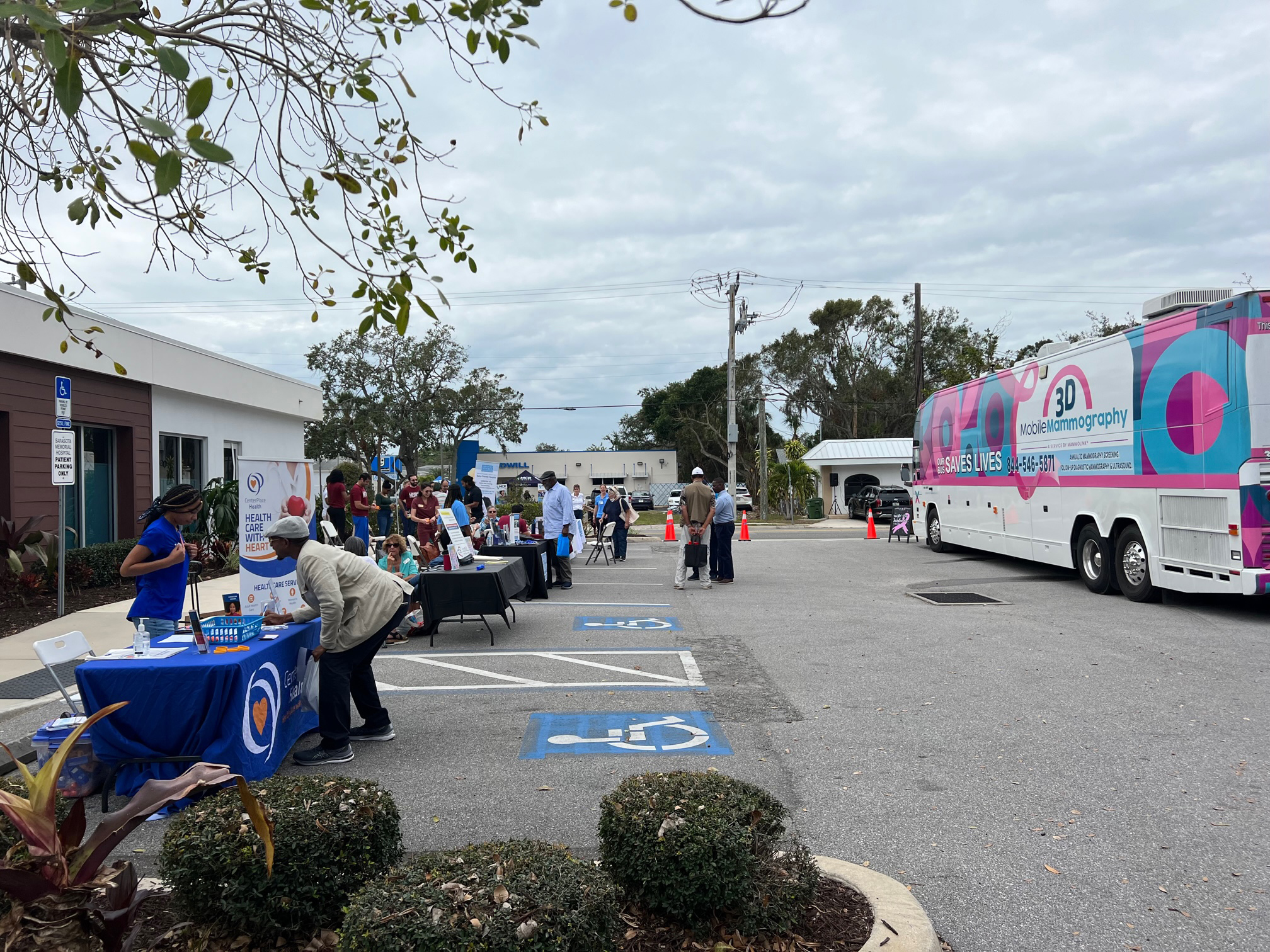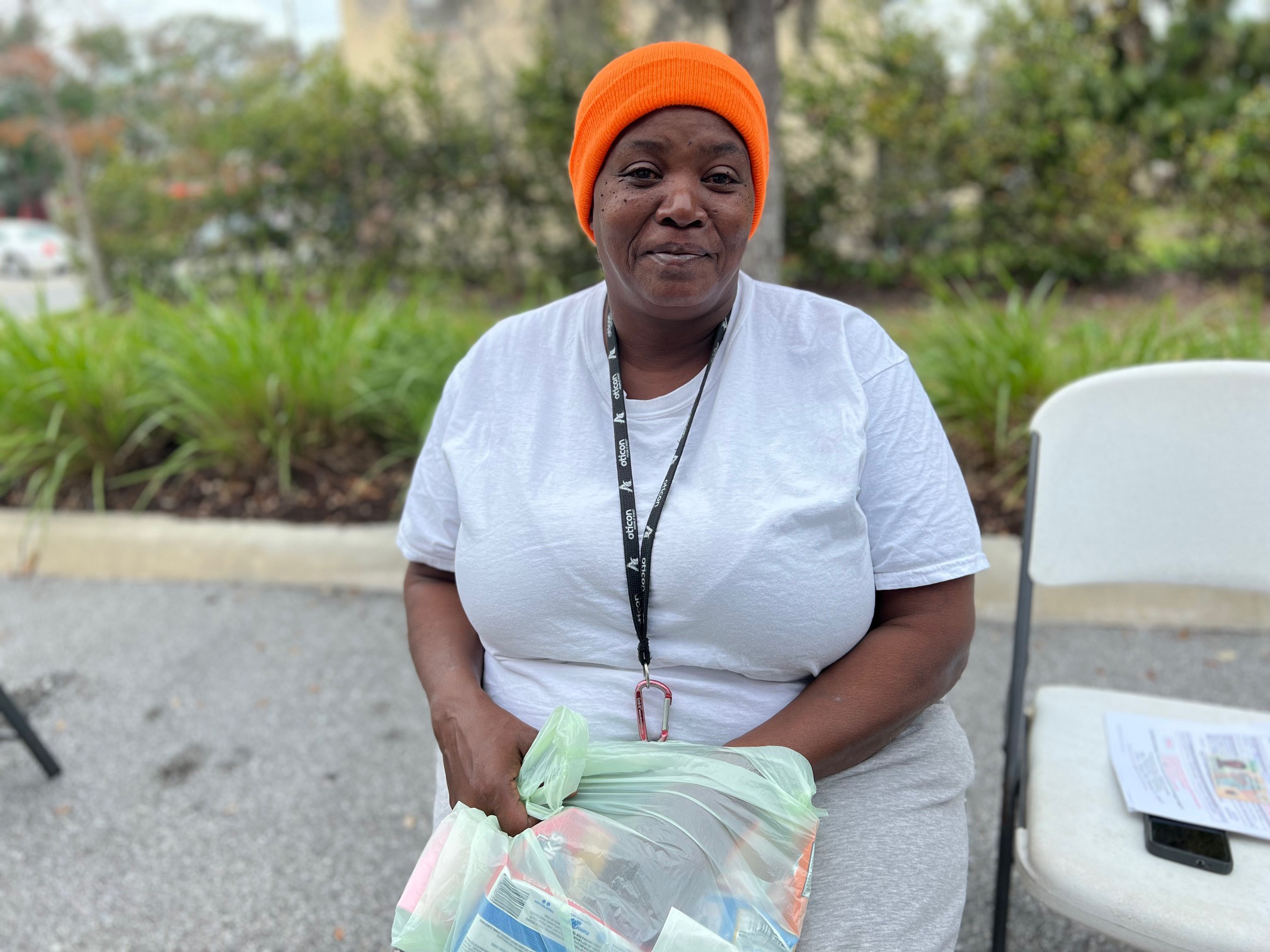
[ad_1]
At a health-screening occasion in Sarasota, Florida, folks gathered in a parking zone and waited their flip for blood strain or diabetes checks. The occasion was held in Sarasota’s Newtown neighborhood, a traditionally Black neighborhood. Native Tracy Inexperienced, 54, joined the road exterior a pink-and-white bus that provided free mammograms.
“It’s a blessing as a result of some folks, like me, aren’t lucky, and so that is what I wanted,” she mentioned.
Inexperienced wished the examination as a result of most cancers runs in her household. And he or she shared one other well being fear: Her giant breasts trigger her extreme again ache. A physician as soon as advisable she get discount surgical procedure, however she’s uninsured and mentioned she will be able to’t afford the process.
In a 2022 Gallup Ballot, 38% of American adults surveyed mentioned that they had postpone medical therapy throughout the earlier 12 months because of value, up from 26% in 2021. The brand new determine is the best since Gallup began monitoring the difficulty in 2001. In a survey by KFF launched final summer time, 43% of respondents mentioned they or a member of the family delayed or postpone well being care due to prices. It discovered folks have been most definitely to delay dental care, adopted by imaginative and prescient companies and physician’s workplace visits. Many didn’t take medicines as prescribed.
The Newtown screening occasion — organized by the nonprofit Multicultural Well being Institute in partnership with a neighborhood hospital and different well being care suppliers — is a part of an effort to fill the protection hole for low-income folks.
Inexperienced defined that her enamel are in dangerous form however dental care will even have to attend. She lacks medical insurance and a secure job. When she will be able to, she finds occasional work as a day laborer by means of a neighborhood temp workplace.
“I solely make like $60 or $70-something a day. You understand that ain’t making no cash,” mentioned Inexperienced. “And a few days you go in they usually don’t have work.”
If she lived in one other state, Inexperienced would possibly have the ability to enroll in Medicaid. However Florida is one among 10 states that haven’t expanded the federal-state medical insurance program to cowl extra working-age adults. With lease and different payments to pay, Inexperienced mentioned, her well being is taking a again seat.
“I don’t have cash to go to the dentist, nothing,” she mentioned. “It’s so costly. Now, to get one extraction, one tooth pulled, it’s like $200-$300 that you simply don’t have. So I don’t know what to do. It’s like preventing a shedding battle proper now.”
Within the KFF ballot, 85% of uninsured adults underneath age 65 mentioned they discovered it tough to pay for well being care. Practically half of their insured counterparts mentioned they struggled with affordability as effectively.

The U.S. inflation fee hit a four-decade peak final 12 months, and components of Florida, together with the Tampa metro space, typically fared even worse.
“We see an rising desperation,” mentioned Dr. Lisa Merritt, government director of the Multicultural Well being Institute.
The nonprofit, which helps folks entry low-cost care, relies in Newtown, the place, inland from Sarasota’s lavish seaside communities, many residents dwell beneath the poverty line, lack insurance coverage, and face different boundaries to constant and inexpensive care.
“It’s very tough for folks to be involved about summary issues like getting screenings, getting common well being upkeep, after they’re contending with the challenges of fundamental survival: meals, shelter, transportation typically,” Merritt mentioned.
Merritt and her crew of volunteers work to construct belief with residents who is probably not conscious that help is offered. They assist folks apply for low-cost insurance coverage protection, free medicine packages, and different assets that may scale back therapy prices. Volunteer Bonnie Hardy mentioned the folks she serves have many monetary worries, however one factor tops the listing.
“Proper now? A spot to remain,” mentioned Hardy. “Housing is horrible.”
Excessive housing prices have began to ease in latest months, however knowledge exhibits lease in Sarasota has risen practically 47% because the pandemic started in 2020. Hardy helps folks discover housing and connects them with packages that cowl prices like utilities and safety deposits. The aim is to stabilize their lives, and he or she mentioned that may enhance well being.
“As a result of they’re extra comfy now,” she mentioned. “They really feel like, hey, the lease is paid, I can let my guard down, perhaps I can go get the medical consideration I would like.”
Analysis exhibits laying aside well being care can result in greater issues. The Gallup Ballot discovered 27% of respondents delayed therapy because of prices even for “very or considerably critical” situations.

Some folks could also be holding off on treating medical points due to well being care debt. An investigation from NPR and KHN discovered about 100 million folks in America had medical debt. About 1 in 8 of them owe greater than $10,000, in response to a KFF ballot.
Treating most cancers or continual situations like diabetes early can save lives and be cheaper than treating advanced-stage diseases, in response to the Facilities for Illness Management and Prevention.
Medical doctors on the well being screening occasion in Newtown mentioned it’s essential to assist residents acquire preventive care. On the well being honest, substitute trainer Crystal Clyburn, 51, acquired a mammogram on the mammography bus and had her blood strain checked.
Clyburn doesn’t have medical insurance and mentioned she depends on free occasions to remain on high of her well being.
“I simply attempt to make the most of no matter that’s on the market, no matter that’s free,” she mentioned. “It’s important to care for your self as a result of you’ll be able to look wholesome and never even know you’re sick.”
After the cuff got here off, a physician informed Clyburn her blood strain was just a little excessive however not excessive sufficient that she wanted to take medicine. Clyburn smiled, thanked him, and left relieved to know that the price of prescribed drugs was one expense she wouldn’t have to fret about.
This text is from a partnership that features WUSF, NPR, and KHN.
[ad_2]